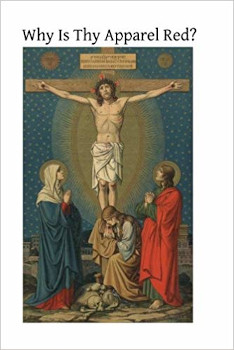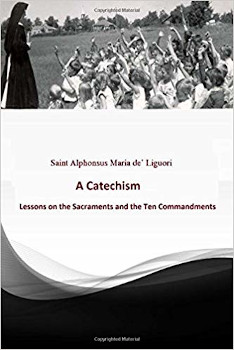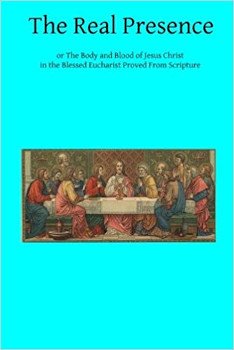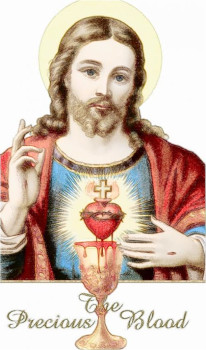July 2019: Olive Tree

Volume II/Issue 39/July 2019


From The Editorial Desk
The Most Precious Blood Of Jesus
Forgiveness of our past sins is our very first and our constant need. The guilt of our sins could not be removed by God by any other way than by the payment of the full penalty for our sins. "Without the shedding of blood, there is no forgiveness/remission" (Hebrews 9:22).
When Christ shed His most precious blood on the cross of Calvary, it purchased the pardon of every sin ever committed by anyone.
But that pardon becomes ours only when we receive it. Through Christ's precious blood we now have the forgiveness of all our sins of the past, if we sincerely turn from our sins (repent), trust in Him as our Lord and Saviour, and receive the forgiveness that he offers through the baptismal waters.
The blood of Christ also justifies us (Romans 5:9).
This is more than just being forgiven. It is our soul made righteous or just, just as though we had never sinned in our entire lives. God's promise is that "He will not remember our sins no more" (Hebrews 8:12). That means that He looks at us just as if we had never sinned. That is the meaning of being justified. Such is the power of Christ's precious blood. Many believers live in perpetual condemnation concerning their past lives, because Satan has hid from them the fact that God has justified them through Christ's blood.
Through the blood of Jesus we are redeemed (1 Peter 1:18).
That means that we have been purchased from the slave-market of sin. The blood that Christ shed on Calvary was the ransom price that He paid to meet the demands of God's holy Law, so that we might be free, and not slaves any longer. We are born to be free. We need not be slaves any longer to Satan or men or to condemnation or guilt or fear or sin.
Through the most precious blood of Jesus Christ, we are also brought into God's presence (Ephesians 2:13).
God dwells in light that no man can approach. The only way to come into His presence is through the most precious blood - till the end of our lives. However saintly we may become, our access to God's presence will always be through the blood of Christ. Many believers tend to forget this, once they get victory over conscious sin, and end up as Pharisees.
Through the blood shed on Calvary's cross, Christ has made peace with God (Colossians 1:20).
God is not an Enemy to us now. This is a fact that needs to be established in our minds firmly. Many believers live with the feeling that God is constantly unhappy with them and is always frowning at them. This is Satan's lie, designed to bring believers into condemnation and to hinder their spiritual growth. Through the blood of Christ, we have become friends of God. Unless we believe this, we will never make any spiritual progress.
The blood of Christ also cleanses us continually from all sin, when we walk in the light (1 John 1:7).
To walk in the light is to walk in victory over all conscious sin. Our Baptism, the sacraments of confession, the Eucharist, etc., gives us the graces to do just that. But even when we live in victory over conscious sin, there is still plenty of unconscious sin in all of us. That is why John goes on to say, "If we say we have no sin, we deceive ourselves" (verse 8).
It is not because we have a flesh, that we sin unconsciously, but because we have lived in conscious selfishness for many years, both prior to, and subsequent to our conversion. Jesus had the same flesh as we have. But because He never lived in selfishness at any time, He never sinned unconsciously even once. There was no sin at all in Him (1 John 3:5).
Our unconscious sins (which constitute perhaps about 90% of our total sins initially) are continually cleansed by Christ's blood, so that we can have constant, and unbroken fellowship with the Father.
Through the most precious blood of Jesus, we also overcome Satan and his accusations (Revelation 12:11).
Satan accuses us to God, to other men and to ourselves constantly. But we can overcome his accusations by confessing ("the word of our testimony") that we have been forgiven, justified, redeemed, brought near to God, brought to peace with God and cleansed by the most precious blood of Christ. Satan can have no power over us any longer.
We need the blood of Christ to cleanse us DAILY, for all of us sin unconsciously daily, and many believers sin consciously as well.

Rend Your Hearts
"Now therefore saith the Lord: Be converted to me with all your heart, in fasting, and in weeping, and in mourning. And rend your hearts, and not your garments, and turn to the Lord your God: for he is gracious and merciful, patient and rich in mercy, and ready to repent of the evil." (Joel 2:12-13)
There is a lot of garment rending in the world today, that is complaining about all of the evils in the world. We wast time complaining about everything from Vatican 2 to Francis' latest in Rome, as if complaining will make anything change. And let us not even think about the time, money and effort wasted on politics, and the garment rending there.
What does the world need today? The world needs revival, which means to bring back to life, that is to spiritual life. Let us remember that revival begins at home in our own hearts. Rather than wasting time on exposing and fighting the evils of the world, let us ask God to expose to our own selves the evils lying within our own hearts and souls. Let us ask God to eradicate these evils in our hearts and souls, and help us to get on the path to sainthood.
Let us look back almost two millenia, when the Apostles set out to convert the world. Did they waste time complaining about the evils of the paganism of the day? No, they taught people about Almighty God and His holy will for all of us. They showed the people the path of virtue and virtually ignored the vice in the world around them. The only vice, the Apostles addressed were the vices that were among the Christians.
Real positive change comes about by living the Gospels in our own lives, especially in our dealings with our neighbors. We need to make the Catholic way of life attractive to people, by the joy that flows from total conformity with the Will of God. Only when our lives conform to the Will of God, do we have any chance for our words to have any real impact for good. Much of the garment rending today, comes from an evil heart, and drives people away from Almighty God.
We rend our garments in order to mourn. And what should we mourn over more than our own sins, and the damage sin causes. First sin is an offense against Almighty God, which makes sin the only real evil in the world. This should be enough for us to rend our garments, and become penitents and mourn the rest of our days.
Let us heed the advice above and be truly converted. Yes, there is much evil in the world today. God can repair the evil, and let us ask Him to begin with the evils in our own hearts and souls.

"Behold, I send My messenger before thy face."
(St. Matthew 11:2 ff)
If you ever write a letter of appreciation, for example, and send it to the president of a big corporation you may indeed receive a response back but more than likely, the response will be sent from a representative on behalf of the president. If you have a question for the company or a complaint addressed to the company, more than likely if you receive a response it will be from a representative of the company. Very often we need messengers to deliver messages for us. Sometimes we have someone give a message to someone else for us. “Tell Aunt Louise for me that I am sick and won’t be coming over.” “Tell my boss at work that I want to work some overtime.” Etc. In that case, the person delivering the message for us is speaking on our behalf. He/She is conveying a message for us.
In a spiritual sense, of course, the angels are the messengers of God. But we also convey messages on behalf of God. We let people know about God not only by what we say but by the way in which we treat one another . . . and love one another . . . . and show courtesy to one another.
In the Eleventh Chapter of the Gospel coming from St. Matthew, we are listening to Our Lord speaking about His cousin, St. John the Baptist. The passage begins by St. John, who is waiting in prison, sending two of his disciples to question Our Blessed Saviour if He is the long-awaited Messiah or should they wait for another. Our Lord responds that if they want to know if He is the Messiah, that they merely need to look at the works that He has done. Then He quotes Scripture in regards to St. John the Baptist:
"Behold, I will send My messenger and he shall prepare the way before Me; and the Lord, Whom ye seek, shall suddenly come to His temple." (Malachi 3:1)
Two things that we should consider: One, Our Lord did indeed come to His temple . . . . He came to earth as a human being. Secondly, Our Lord does not need our assistance but He welcomes our assistance.
As I try to make the point so often, we do not have a God Who is far off or distant. In other words, we do not have a God Who created us and then stays away at a distance. He, on the other hand, was so concerned for His creation that He became One with His creation . . . like us in all things but sin.
"Who is like unto the Lord Our God, Who dwelleth on high, Who humbleth Himself to behold the things that are in Heaven and in the earth." (Psalm 113:5-6)
We have a God Who not only created the universe but humbled Himself to become One with His creation.
"But we see Jesus, Who was made a little lower than the angels for the suffering of death, crowned with glory and honour; that by the grace of God should taste death for every man." (Hebrews 2:9)
Christ made Himself lower than the angels so that He could not only experience living as a human being, walking in your shoes, but also so that He could experience death. By experiencing death, He defeated death. And by joining His Immortality to our mortality, by defeating death, He has included us and we are the ones who will benefit by His dying on the Cross but also by His rising to life again.
In regards to the second point, the same God Who created the universe does not need or require my help or assistance . . . . but He does appreciate it when I do assist Him. In other words, He does not require our help . . . . but He does desire our help.
Whether it be St. John the Baptist, St. Mary, St. Joseph, St. Margaret of Scotland, St. Gemma Galgani, etc. the point is that each one of us can assist Our Lord in proclaiming the Gospel. Each one of us has the opportunity to prepare the way of the Lord through our actions and our words. St. James writes "But be ye doers of the Word, and not hearers only, deceiving your ownselves." (St. James 1:22)
Remember that Our Lord humbled Himself, not for His benefit, but for our benefit. He had no need to humble Himself, but He did it out of love for you and me. Thus, we can repay Our Lord by imitating St. John the Baptist and proclaiming the Gospel to those around us."

The Funny Pharmacy
A joyful mind maketh age flourishing: a sorrowful spirit drieth up the bones. - Proverbs 17:22







Without getting into the question of formal versus material heresy, would it have made a difference if he were not a heretic before his election?
If he had not been a heretic prior to his election, then he would have become Pope. However, notorious public heresy after election removes one from Office. (Canon 188, paragraph 4) Canonists, though, are not in agreement in how to deal with such a problem.

The Pope Speaks: July 2019
Noah
What do we know about Noah and his times? Scripture tells us some, and we can infer some more from considering what Scripture tells us. Someone recently did some research, considering the life spans and a conservative estimate of the number of children couples had in those days. He concluded that when the flood came, the world's population was about a billion people. Some have also considered that the people of that time were technically advanced. Consider what some men have invented in a life of seventy or eight years. "The days of our years in them are threescore and ten years. But if in the strong they be fourscore years: and what is more of them is labour and sorrow." (Psalms 89:10) Now consider a life ten times as long, seven hundred to eight hundred years (Genesis 5). What could an inventor accomplish in such a long life? And so these assumptions could very well be true.
Let us consider what we know about Noah from Scripture. "And Noe, when he was five hundred years old, begot Sem, Cham, and Japheth." (Genesis 5:31) Now compared to his ancestors, this is rather late in life, for instance his father: "And Lamech lived a hundred and eighty-two years, and begot a son. And he called his name Noe, saying: This same shall comfort us from the works and labours of our hands on the earth, which the Lord hath cursed. And Lamech lived after he begot Noe, five hundred and ninety-five years, and begot sons and daughters." (Genesis 5:28-30)
Let us assume that Noah only had three sons, and those later in life and then consider another aspect of Noah. "And spared not the original world, but preserved Noe, the eighth person, the preacher of justice, the herald of righteousness, bringing in the flood upon the world of the ungodly." (II Peter 2:5 Douay and KJV) We are not told when Noah preached. Let us consider, Noah's father had other children, who presumably also had children and grand children. Noah, being possibly childless, was probably very busy in the lives of his nieces and nephews. He also would have had aunts and uncles and many other relatives. As an uncle myself, and single, I also had a large part in my nieces and nephews' lives for many years. And part of this is teaching and yes, even preaching. A very important part of the education of children is teaching them the way to heaven. And so we can consider that Noah began preaching about a hundred and fifty years old. And so he was a preacher of righteousness for three hundred and fifty years before he had children. Scripture does not say when God came and told Noah to build the Ark. We can infer that it was after his three sons were born from reading Genesis chapter six.
And what do we know about the time before the flood? "And God seeing that the wickedness of men was great on the earth, and that all the thought of their heart was bent upon evil at all times, It repented him that he had made man on the earth. And being touched inwardly with sorrow of heart, He said: I will destroy man, whom I have created, from the face of the earth, from man even to beasts, from the creeping thing even to the fowls of the air, for it repenteth me that I have made them. But Noe found grace before the Lord." (Genesis 6:5-8)
"And as in the days of Noe, so shall also the coming of the Son of man be. For as in the days before the flood, they were eating and drinking, marrying and giving in marriage, even till that day in which Noe entered into the ark, And they knew not till the flood came, and took them all away; so also shall the coming of the Son of man be. " (Matthew 24:37-39) In the Gospels in several places, Jesus talks about an evil time that will come upon the world. "And as it came to pass in the days of Noe, so shall it be also in the days of the Son of man. They did eat and drink, they married wives, and were given in marriage, until the day that Noe entered into the ark: and the flood came and destroyed them all. Likewise as it came to pass, in the days of Lot: they did eat and drink, they bought and sold, they planted and built. And in the day that Lot went out of Sodom, it rained fire and brimstone from heaven, and destroyed them all. Even thus shall it be in the day when the Son of man shall be revealed." (Luke 17:26-30) These references come after a description of many evils that will be fall the world. Read these two chapters as well as Mark 13 and Luke 21. In Saint Matthew's Gospel (24:13), Jesus warns us of these times: "And because iniquity hath abounded, the charity of many shall grow cold."
Some believe we are in the times recounted here in Sacred Scripture, times which will bring on the man of son, son of perdition, the Antichrist. (II Thessalonians 2:3-4) Of these times Jesus warns: "For there shall be then great tribulation, such as hath not been from the beginning of the world until now, neither shall be." (Matthew 24:21) In other words this will be the worst time in history. "For in those days shall be such tribulations, as were not from the beginning of the creation which God created until now, neither shall be." (Mark 13:19)
We know that today sin is abounding, just as it was in the days of Noah. Do we even listen to the preachers of righteousness today? Eight were saved in the Ark, which is a symbol of the Church. Jesus said: "I say to you, that he will quickly revenge them. But yet the Son of man, when he cometh, shall he find, think you, faith on earth?" (Luke 18:9) If only eight out of a billion were saved in the Ark, how many will be saved in the Ark of the New Covenant, the Church? The Prophet Isaias (10:19) tells us: "And they that remain of the trees of his forest shall be so few, that they shall easily be numbered, and a child shall write them down." Saint Athanasius wrote to his flock from his place of exile: "Even if Catholics faithful to Tradition are reduced to a handful, they are the ones who are the Church of Jesus Christ." This was during the Arian heresy. We have already seen that this time will be worse, and Saint Athanasius considers the faithful could be reduced to a handful. Saint Augustine says that the Church in the Old Testament was reduced to a single person at some times in history, such as Noah at the flood. We might consider eight were saved, but were they all truly just? When we read Scripture, we find out that one of Noah's son was not that good and was eventually cursed.
If we believe we are in these times, we should not be looking for safety in numbers as the people did at the time of the flood, but for the few, the humble, the true Catholics.


Dear soul, it is a joy to write to you again.
This month we complete the sayings from Evagrius on prayer. As you read over these final instructions I hope that they have served you as they have served so many through the centuries in assisting the cultivation of the life of prayer. Let us hear these final words, and then let us pray, dear soul.
141. So long as you have not renounced the passions, and your intellect is still opposed to holiness and truth, you will not find the fragrance of incense in your breast.
142. Do you have a longing for prayer? Then leave the things of this world and live your life in heaven, not just theoretically but in angelic action and godlike knowledge.
143. If it is only in times of adversity that you remember the Judge and how awe-inspiring and impartial He is, you have not yet learned 'to serve the Lord with fear and rejoice in Him with trembling' (Ps. 2:1 1). For even in a state of spiritual peace and blessedness you should still worship Him with reverence and awe.
144. Until a man is completely changed by repentance, he will be wise always to remember his sins with sorrow and to recall the eternal fire which they justly deserve.
145. If a man, still enmeshed in sin and anger, dares shamelessly to reach out for knowledge of divine things, or even to embark upon immaterial prayer, he deserves the rebuke given by the Apostle: for it is dangerous for him to pray with head bare and uncovered. Such a soul, he says, ought 'to have a veil on her head because of the angels' who are present (cf. 1 Cor. 1 1:5-ff.), and to be clothed in due reverence and humility.
146. Just as persistent staring at the sun in its noonday brilliance will not cure a man suffering from ophthalmia, so the counterfeit practice of fearful and supernal prayer - which is properly to be performed in spirit and in truth - will in no way benefit an intellect that is passionate and impure; on the contrary, such practice will provoke the wrath of God against the intellect.
147. If He who is in want of nothing and shows no favors did not receive the man coming with a gift to the altar until he was reconciled with his neighbor who had something against him (cf Matt. 5:23-24), consider how much we must be on guard and use discrimination if we are to offer at the spiritual altar incense that is acceptable to God.
148. Do not delight in words or in glory. Otherwise the demons will no longer work behind your back, but openly before your face: and they will laugh you to scorn during prayer, drawing you away and enticing you into strange thoughts.
149. If you seek prayer attentively you will find it; for nothing is more essential to prayer than attentiveness. So do all you can to acquire it.
150. As sight is superior to all the other senses, so prayer is more divine than all the other virtues.
151. The value of prayer lies not in mere quantity but in its quality'. This is shown by the contrast of the two men who went up into the temple (cf. Luke 18:10), and by the injunction: 'When you pray, do not use vain repetitions' (Matt. 6:7).
152. So long as you give attention to the beauty of the body, and your intellect delights in the outside of the tabernacle, you have not yet perceived the realm of prayer and are still far from treading its blessed path.
153. If when praying no other joy can attract you, then truly you have found prayer.
FINIS

Saints from East and West
Saints whose feasts are celebrated this month

July 17 (Byzantine) - The Great Martyress Saint Marina
The Holy Great Martyress Marina was born in Asia Minor, in the city of Antioch, into the family of a pagan priest. In infancy she lost her mother, and her father gave her over into the care of a nursemaid, who raised Marina in the Christian faith.
Upon learning that his daughter had become a Christian, the father angrily disowned her. During the time of the persecution against Christians under the emperor Diocletian (284-305), Saint Marina at fifteen years of age was arrested and locked up in prison. With firm trust in the will of God and His help, the young prisoner prepared for her impending fate.
The governor Olymbrios, charmed with the beautiful girl, tried to persuade her to renounce the Christian faith and become his wife. But the saint, unswayed, refused his false offers. The vexed governor gave the holy martyress over to torture. Having beaten her fiercely, they fastened the saint with nails to a board and tore at her body with tridents. The governor himself, unable to bear the horror of these tortures, hid his face in his hands. But the holy martyress remained unyielding. Thrown for the night into prison, she was granted Heavenly aid and healed of her wounds. Tied to a tree, they scorched the martyress with fire. Barely alive, the martyress prayed: "Lord, Thou hast granted me to go through fire for Thine Name, grant me also to go through the water of holy Baptism."
Hearing the word "water," the governor gave orders to drown the saint in a large barrel. The martyress besought the Lord that this manner of execution should become for her holy Baptism. When they plunged her into the water, there suddenly shone a light, and a snow-white dove came down from Heaven, bearing in its beak a golden crown. The fetters put upon Saint Marina of themselves came apart. The martyress stood up in the fount of Baptism glorifying the Holy Trinity - Father, Son, and Holy Spirit. Saint Marina emerged from the fount completely healed, without any trace of burns. Amazed at this miracle, the people glorified the True God, and many came to believe. This brought the governor into a rage, and he gave orders to kill anyone who might confess the Name of Christ. There then perished 15,000 Christians, and the holy Martyress Marina was beheaded. The sufferings of the Great Martyress Marina were described by an eye-witness of the event, named Theotimos.

July 19 - Pope Saint Symmachus
According to the Liber Pontificalis, this pope was the son of one Fortunatus, and a native of Sardinia. He was baptized at Rome, became archdeacon of the Roman church under Pope Anastasius II, and succeeded him in the Holy See in 498. But there was a minority of the clergy with Byzantine sympathies, and they, on the same day that Symmachus was elected at the Lateran, met at Santa Maria Maggiore and elected one Laurence, the archpriest of St Praxedes; they were helped with money by Festus, a senator who had been gained by Anastasius, emperor at Constantinople and later a protector of the monophysites, to endeavour to procure papal confirmation of the Henotikon of Zeno, an imperial document condemned by the Holy See. Both claimants appealed to Theodoric, the Gothic king at Ravenna (he was an Arian), who decided in favour of Symmachus as the lawful pope because he had been elected first and by the greater number; he also gave him a testimonial that he "loved the clergy and the poor, and was good, prudent, kindly and gracious." But this far from ended the troubles, which disturbed all the first half of the pontificate.
The name of St Symmachus does not figure in the earlier martyrologies, and little is known of him personally. When the Arian Thrasimund banished many African bishops to Sardinia, Symmachus sent them clothes and money for themselves and their flocks; there is still extant a letter which he sent to comfort them, accompanied by some relics of martyrs. He established three hospices for the poor, sent relief to those suffering from barbarian raids in northern Italy, and redeemed many captives. He decorated and restored several churches in Rome, and built a new basilica of St Andrew, one of St Pancras outside the walls, and one of St Agnes on the Aurelian Way. According to custom inscriptions were made on the various works; in one the thankful pope refers to the end of the troubles with Laurence: "The biting of the wolves has ceased." Pope St Symmachus died on July 19, 514, and was buried in St Peter's.


Books to feed your faith!

Why Is Thy Apparel Red?: Or the Glories of the Precious Blood
$14.95
Saint Catherine of Siena bids us fill our memory with thoughts of the Precious Blood of Jesus. This the writer has attempted to do in the following pages. Those who thirst for the love of God and for the salvation of souls, yet feel oppressed by the consequences of their sins, and are diffident about the efficacy of their prayers, will find in the devotion to the Blood of our Redeemer a source of consolation and encouragement altogether too little known and appreciated. The Church elevates the chalice every morning at Mass for our adoration and as a propitiation for our sins, and her liturgical prayers are replete with invocations to the Precious Blood, to awaken our confidence in this Blood of the Atonement. "Having therefore, brethren, a confidence in the entering into the holies by the blood of Christ" (Heb. X, 19). Our Eucharistic Lord is glorified in the Blessed Sacrament by the devotion to His Divine Blood, trampled under foot in the Passion, but now acclaimed with joy by us, the chosen people of the New Law, as the Price of our Redemption. IIis Blood be upon us and upon our children for the sanctification of our souls!

Catechism: Lessons on the Sacraments and the Ten Commandments
$14.95
Dearly beloved Christian, impress well on your mind the mysteries of your holy faith, and the things that are necessary for making your confessions and Communions with fruit. And after having learned them well, repeat them at home and teach them to others. You will thus give great pleasure to Jesus Christ; and with a little trouble you shall share in and gain all the good which, through your instructions, others shall afterwards do. In order to save your soul, it is not enough for you to be made a Christian by the sacrament of Baptism, which you have received; it is, moreover, necessary for you to know the mysteries of faith, to observe the commandments of God and the Church, and to receive the holy Sacraments with the requisite dispositions. First, you must believe that there is one only God, and that He is omnipotent; that is, that He has created the heavens, the earth, the angels, men, yourself, and all things. God is immense; that is, He is in heaven, on earth, and in all places. God is just; He punishes sinners, and rewards the good; He sends to hell all who die in mortal sin, and gives the glory of heaven to them who die in His grace. You must believe in the most holy Trinity; that is, that in this infinite, eternal, omnipotent, immense, and just God, there are three divine persons, who are called Father, Son, and Holy Ghost; three persons, and only one God. You must believe that the Son of God, that is, the second person of the most holy Trinity, was made man in the most chaste womb of the Virgin Mary by the operation of the Holy Ghost; that He was born an infant, in a stable, and that He died on a cross in order to save our souls; and that He is called Jesus Christ, true God and true man; that, after death, He arose again the third day from the dead, that He ascended into heaven, and sits at the right hand of the Father; that, on the day of the general judgment, He will come to judge the whole world; that He will send to hell the souls and bodies of all who have died in mortal sin, and that He will bring with Him into heaven the souls and bodies of them who have died in His grace. You must believe that Jesus Christ has instituted the holy Sacraments, by means of which He pardons our sins and sanctifies our souls, by applying to us His own merits and the efficacy of His precious blood. And all these truths of faith you must believe, not because the priest teaches them to you, but because Jesus Christ has taught them to His Church, and His holy Church teaches them to us. And by this holy Church I mean the Pope, who teaches all the faithful, or the holy pastors along with the Pope, who is their head.

$16.95
Nicholas Patrick Cardinal Wiseman very ably proves that the Bible proves the real presence of our Lord Jesus Christ in the Most Blessed Eucharist and in the Holy Sacrifice of the Mass. He begins by presenting the Catholic doctrine as well as the beliefs of the other Christian Churches. He then proceeds to the proof from various portions of Sacred Scripture, such as chapter six of Saint John's Gospel and he words of institution of Jesus, Himself. He then demonstrates how the Protestant interpretation does not fit the clear meaning of the Bible. He closes with a discussion of the Catholic doctrine of transubstantiation.
For More Good Traditional Catholic Books:


Cousin Elmer's Summer Fruit Salad

Ingredients
2/3 cup fresh orange juice
1/3 cup fresh lemon juice
1/3 cup packed brown sugar
1/2 teaspoon grated orange zest
1/2 teaspoon grated lemon zest
1 teaspoon vanilla extract
2 cups cubed fresh pineapple
2 cups strawberries, hulled and sliced
3 kiwi fruit, peeled and sliced
3 bananas, sliced
2 oranges, peeled and sectioned
1 cup seedless grapes
2 cups blueberries
Directions
Bring orange juice, lemon juice, brown sugar, orange zest, and lemon zest to a boil in a saucepan over medium-high heat. Reduce heat to medium-low, and simmer until slightly thickened, about 5 minutes. Remove from heat, and stir in vanilla extract. Set aside to cool.
Layer the fruit in a large, clear glass bowl in this order: pineapple, strawberries, kiwi fruit, bananas, oranges, grapes, and blueberries. Pour the cooled sauce over the fruit. Cover and refrigerate for 3 to 4 hours before serving.
Alma Mae's Summer Squash Bread

Ingredients3 eggs, beaten
2 cups white sugar
1 cup vegetable oil
2 teaspoons vanilla extract
3 cups all-purpose flour
3 teaspoons baking powder
2 teaspoons ground cinnamon
2 teaspoons ground nutmeg
2 cups shredded summer squash
Directions
In a large bowl, use an electric mixer to beat the eggs until fluffy. Beat in the sugar, oil, and vanilla. Gradually mix in the flour, baking powder, cinnamon, and nutmeg. Fold in the squash. Transfer to the prepared baking dish.
Bake 45 minutes in the preheated oven, until a knife inserted in the center comes out clean.

Video sermons and instructions: Timeless timely truths for living the Faith
Fourth Sunday after Pentecost 2011
Precious Blood of Jesus 2012
A Forgotten Part of Charity 2013
Lamp and Light: Swine Storms and Mother in Laws

COMING SOON! OUR DAILY PASSION PODCAST

“I am nailed to the cross with Christ. nevertheless I live; yet not I; but Christ liveth in me.” (Galatians 2:20)
It is only when the 'I' is crucified that Christ can manifest Himself within us. The Holy Spirit transforms us into the image of Christ day by day, and year by year, But the pathway of transformation into the image of Christ is via the PASSION of the cross. “If any man will come after me, let him deny himself, and take up his cross daily, and follow me.” (Luke 9:23) If we through the Spirit, allow the passion of the cross to put to death our self-life, we shall know the abundance of Christ's life, not otherwise.
We at OUR DAILY PASSION Podcast desire to help others die to self and live for God daily through our Sermons, Devotionals, Scripture Studies, and Catechism Lessons that come from a Catholic perspective!



VIE CATHOLIC RADIO EVENTS FOR JULY
The month of July is dedicated to the Most Precious Blood of our Redeemer. Supreme homage is given to the Sacred Blood. As we adore the Sacred Heart, because it is the Heart of Jesus, who is God, so we also adore His Most Precious Blood.
The Blood of Jesus is the fountain of salvation. Each drop that flowed from the wounds of the Saviour is a pledge of man’s eternal salvation. All races of the earth have been ransomed, and all individuals, who will allow the saving power of the Sacred Blood to be applied to their soul, are heirs of heaven. St. John Chrysostom calls the Precious Blood “the saviour of souls”; St. Thomas Aquinas, “the key to heaven’s treasures”; St. Ambrose, “pure gold of ineffable worth”; St. Mary Magdalene de Pazzi, “a magnet of souls and pledge of eternal life”. The sins of mankind, in their number, in their offense to the Supreme Being, in the effects on transgressors, are immense; yet, the Precious Blood of Jesus is not frightened by numbers, it has in Itself the power to appease an angered God and to heal wounded creatures.
The Precious Blood is a cleansing bath. Unlike all other blood, which stains, the Blood of Jesus washes clean and white. According to the words of St. John, in the Apocalypse, the Angels wonder, and the question is asked: “These that are clothed in white robes, who are they?” The Lord answers: “These are they that have washed their robes, and have made them white in the Blood of the Lamb.” For no other reason did the Precious Blood flow but to regain for the souls of men the beautiful dress of innocence, and , once regained, to preserve it throughout life and into eternity.
The Blood of the Saviour is a well of consolation for troubled hearts. Can anyone, confidingly, look at the Sacred Blood trickling down from the Cross without taking courage to carry on, in spite of the difficulties which are the common lot of all? One glance at the Cross must be able to drive away fear. And, another, must be able to instill trust in Him who did not rest until the last drop, mingled with water, flowed out of an opened Heart. He, who was willing to do so much for men, must be willing to overlook and forget the frailties which they deeply regret; He must be willing to come to their assistance when harassed, to defend them when tempted, to comfort them when afflicted. The Blood of Jesus must be for Christians what the north-star is to sailors.
Would that men on earth honored the Precious Blood in the manner in which they who are in heaven give honor and praise and thanksgiving! They proclaim that It purchased the glory which they enjoy. Without It, they would have remained slaves of Satan and outcasts from the eternal mansions of God. Let us profess that we owe to the Sacred Blood of Jesus all that we have in this life, and that to It we shall owe all that we shall enjoy in a better and eternal life! Check out all the programs we have to offer this month!
The Stations of the Cross:
The Stations of the Cross are a 14-step Catholic devotion that commemorates Jesus Christ's last day on Earth as a man. The 14 devotions, or stations, focus on specific events of His last day, beginning with His condemnation. The stations are commonly used as a mini pilgrimage as the individual moves from station to station. At each station, the individual recalls and meditates on a specific event from Christ's last day. Specific prayers are recited, then the individual moves to the next station until all 14 are complete. Join us Tuesday, Thursdays and Saturdays as we walk the steps that Jesus walked. See Program Guide for times.
The Angelus and The Rosary:
Everyday the Angelus, which commemorates the Incarnation of Jesus, and the Rosary, which is a devotion in honor of the Virgin Mary, is said morning, noon and night. Follow along with us in prayer everyday!
Lamp and Light:
Lamp and Light Bible study takes the listener through the entire Bible, threading back and forth between the Old and New Testaments. Be sure to tune in so that you will not miss any part of the Bible study.
Sacred Moments:
It has been said that “The higher goal of spiritual living is not to amass a wealth of information, but to face sacred moments.” and that is what our desire is for you. To experience through our weekly devotion, a sacred moment. One that you can savor through out the day. One that reminds you that God is alive and active in your live.
Sunday Sermon:
You can listen to four Sunday Sermons, including one by Saint Alphonsus, each day that could cause permanent life changes by stepping on your toes!
Life Is Worth Living:
Fulton Sheen's renowned and inspiring television series was watched by millions of viewers from all walks of life and every religious belief. His timeless insights give wise, personal and inspiring guidance on the problems affecting our lives in today’s world. His talks cover an amazing variety of subjects, from the character of the Irish to the handling of teenagers. He discusses education, Christianity, relativity, and world affairs. He speaks about love, conscience, fear, motherhood, work. He tells amusing anecdotes, recites poetry, and ponders the fate of the free world as well as America’s destiny.
Fulton Sheen's Catechism:
...is a 50 part series on the fundamental teachings of the Catholic Church recorded in 1965 in the privacy of his own study. This Catechism program is truly priceless! Fulton Sheen's captivating voice and message comes through loud and clear, even for today.
Catechism Corner:
Catechism Corner discuss our Catholic faith in an easy to understand manner each week. The talks are given by our own in House Priest from the Rectory of the St. Helen Catholic Mission. You won't want to miss a lesson!
Family Theater:
Family Theater is a dramatic radio show which was produced by Family Theater Productions, a film and radio studio extension of the Family Rosary Crusade founded by the Holy Cross Priest, Father Patrick Peyton, CSC, as a way to promote family prayer. The motto of Holy Cross Family Ministries is "The family that prays together stays together."
The Bible Comes Alive:
Your Story Hour produces family-friendly radio dramas based on the Bible, historical heroes, and true-to-life adventures. Our stories--brought to life by talented voice actors, descriptive sound effects and compelling music--teach Christian values, positive character traits and principles for good decision-making.
Ranger Bill:
Ranger Bill is a Christian radio program from the 1950s. Ranger Bill stars Miron Canaday as the title character and Stumpy Jenkins. And Ed Ronne Sr. as Grey Wolf. The main character, Ranger Bill, is a forest ranger located in the town of Knotty Pine along the Rocky Mountains. The show describes the various tales of the adventures of Ranger Bill and his friends
Plus More sprinkled through out the day!:
Paul Harveys' The Rest of The Story- The Rest of the Story consists of stories presented as little-known or forgotten facts on a variety of subjects with some key element of the story (usually the name of some well-known person) held back until the end
Jelly Telly- A 5 Minute Family Devotional featuring Clive & Ian's Character Quest! 12 short devotionals that will teach your kids all about important character traits from the Bible - from generosity to courage to compassion and more!
Creation Moments- presenting scientific evidence for the Bible and its literal truths. Each short program provides accurate, up-to-date information about new discoveries in God's creation.
Life Line- Short programs that communicates Biblical Truths in a humorous, thought-provoking way
No Apologies- is basic apologetic of the Catholic Church, that defends the faith, with a Marian emphasis.
Saints Meeting Saints- a short program sprinkled through out the day that gives Saints in the making on earth a chance to learn more about the Saints in heaven!
These are just some of the little jewels you can hear through out the week.
Music To Tickle Your Ears:
We have a whole genre of musical programs. Such as Friday Night Gospel Bluegrass, Saturday Night Alive-Praise and Worship, and Sounds of Joy-Sacred Music. That doesn't count the Gregorian Chant heard every day four times a day!


"And the earth brought forth the green herb, and such as yieldeth seed according to its kind, and the tree that beareth fruit, having seed each one according to its kind. And God saw that it was good." - Genesis 1:12
Coryanthes macrantha, commonly known as the bucket orchid, grows in Mexico and Central and South America. The pretty, but unassuming, flowers form a little receptacle or bucket, into which the flower drips a strongly scented fluid. This scent attracts the flower’s only pollinator – the beautiful, green, male orchid bee.
On entering the flower, the bee falls into the bucket trap. But it is not the orchid’s purpose to kill the bee. The bee soon finds a little step, and an escape hatch. However, the flower grips the bee and glues two pollen sacks to its back. When the glue is dry, the flower releases the unharmed bee, which makes its escape.
The pollen sacks and the scent are essential to the bee’s own courtship ritual with female bees. It is the orchid’s scent which is attractive to the female.
If a male bee which already has pollen sacks on its back enters the bucket orchid, then the flower simply snatches the sacks off the back of the bee and releases it immediately, thus completing the flower’s rather complicated pollination process.
Most articles about the orchid and the bee refer to their co-evolution, which has left them totally dependent on each other. Yet, no partially evolved orchid could survive.
An orchid whose escape hatch was too big would release the bee without the pollen, while too small a hatch would trap the bee until it died. Either way, a partially evolved orchid could not pollinate. So-called co-evolution is clearly impossible.

Catechism Catch-Up
By What Authority Can A Priest Forgive Sin?
And again he entered into Capharnaum after some days. And it was heard that he was in the house, and many came together, so that there was no room; no, not even at the door; and he spoke to them the word.
And they came to him, bringing one sick of the palsy, who was carried by four. And when they could not offer him unto him for the multitude, they uncovered the roof where he was; and opening it, they let down the bed wherein the man sick of the palsy lay.
And when Jesus had seen their faith, he saith to the sick of the palsy: Son, thy sins are forgiven thee. And there were some of the scribes sitting there, and thinking in their hearts: Why doth this man speak thus? he blasphemeth. Who can forgive sins, but God only? Which Jesus presently knowing in his spirit, that they so thought within themselves, saith to them: Why think you these things in your hearts?
Which is easier, to say to the sick of the palsy: Thy sins are forgiven thee; or to say: Arise, take up thy bed, and walk? But that you may know that the Son of man hath power on earth to forgive sins, (he saith to the sick of the palsy,) I say to thee: Arise, take up thy bed, and go into thy house. And immediately he arose; and taking up his bed, went his way in the sight of all; so that all wondered and glorified God, saying: We never saw the like. (Mark 2:1-12)
Some friends of a man sick of palsy carried him to the house where Jesus was staying. Now to be sick with palsy was to be paralyzed either completely or partially. It could be accompanied by loss of sensation and uncontrollable body movements or tremors.
When these friends got to the house, they found the house to be packed with people wanting to hear Jesus and be healed by him. The friends climbed up an outside staircase and dug a hole through the roof. Then they lowered their friend down to the place where Jesus was. Jesus was so impressed by the faith of these men. First, Jesus forgave the man’s sins. and then, he healed the man so that he could get up and walk.
Now listen to what the scribes thought in their heart: "Why doth this man speak thus? he blasphemeth. Who can forgive sins, but God only?" (Mark 2:7)
First, We see that they considered Jesus as Man. They would be right. But that is only half the Truth. He was also God. The Man God.
Second, They felt that He was blaspheming. In this they would have been right except that they did not realize the whole story.
Thirdly, They were saying only God could forgive sin.
Were they right? Could only God forgive sin? The answer....yes. Ask just about any Protestant and they will say the same thing. Only God can forgive sin.
But listen to the answer Jesus gave when he realized what they were thinking:
"Which is easier, to say to the sick of the palsy: Thy sins are forgiven thee; or to say: Arise, take up thy bed, and walk? But that you may know that the Son of man hath power on earth to forgive sins, (he saith to the sick of the palsy,) I say to thee: Arise, take up thy bed, and go into thy house." (Mark 2: 10-11)
Let's look closer at Jesus answer.
He called Himself the Son of Man not the Son of God. Why?
The common understanding is that "Son of God" implies his deity—which it does—and that "Son of Man" implies his humanity, which it does too.
He was a son of man, that is, a human being. And He is the Son of God, in that He has always existed as the Eternally Begotten One who comes forth from the Father forever. He always has, and He always will. He is the Second Person of the Trinity with all of the divine nature fully in Him.
He is born of a Virgin. He was conceived of the Holy Spirit in the Virgin Mary. Thus He is human—fully human. The Bible wants to emphasize that He is fully human.
So that's the common understanding: He is both divine and He is human—two natures, one person.
If you do a study of the term "Son of Man" in the Gospels you'll see that he didn't refer to himself most often as Son of God but as Son of Man. He said things like, in Mark 10:45, "For the Son of man also is not come to be ministered unto, but to minister, and to give his life a redemption for many. ." So he calls himself Son of Man very often.
The Son of Man (Jesus in his humanity) had power.
What do we mean by having power? Was he saying he was a Super...Man?
There are six Greek words used for power in the New Testament. Exousia, dunamis, ischus, kratos, energeia, and bia.
For the sake of time we will only give the definition to the greek word that is used in Mark 2:10-11. And that word is Exousia.
Exousia: it denotes "authority", permission, or liberty of doing as one pleases, it passed to that of "the ability or strength with which one is endued," then to that of the "power of authority," the right to exercise power.
So we see that the Son of Man, (Jesus in his humanity), has power (has authority).
Who gave him that authority? Well, as the scribes said. "Only God can forgive sin" And who is God? As we said before, Jesus is God and Man and so He gave himself the authority, as God, to forgive sins.
Now lets fast forward to Jesus Ascension into heaven.
At this time He gives the great commission. Matthew, Mark and Luke each has a record of the great commission even though they differ in exact language (Matthew 28:18-19; Mark 16:-15-18; Luke 24:47-49). John 20:21-23 is John’s account of the great commission.
Matthew 28:18-19 records that Jesus said to the Apostles, "And Jesus coming, spoke to them, saying: All power is given to me in heaven and in earth." That word power is all Exousia, all authority. He therefore hands that authority over to the Apostles. "Going therefore, teach ye all nations; baptizing them in the name of the Father, and of the Son, and of the Holy Ghost. Teaching them to observe all things whatsoever I have commanded you.
Jesus authorizes, he exousia, the Apostles to make disciples, baptize, and catechise. All the Gospels pretty much say the same thing. But St. John's gospel added one more thing. After breathing on them and giving them the Holy Spirit, he says this:
Whose sins you shall forgive, they are forgiven them; and whose sins you shall retain, they are retained. (John 20:23)
Remember when I said Only God can forgive sin? And because Jesus is God and Man He was able to give himself the authority, as God, to forgive sins on earth while he was in His body. But now at the ascension he is about to leave. He is leaving his body the Church (see I Corinthians 12) behind with the authority to do what He did as Man. And one of those things he gave authority to do is to forgive sins, or retain them.
Let me put it this way. In the Gospels, (Matthew 17:2, Mark 9:2–3, Luke 9:28–36), Jesus gave the Apostles a preview of what he would look like in his heavenly body during the Transfiguration. I believe that at the ascension they saw again the transfiguration. But this time he was taken into the clouds and into heaven. His Earthly body transfigured permanently.
Now we the Church (The Militant Church) are his earthly body. We the Church have been given authority to do what Jesus did on earth. And among these things is the authority to forgive sin and or to retain sin.
Living Catholic:
What Should I Do If My Authorities Ask Me To Do Wrong?
God requires everyone to be under authority. Children are to be under the authority and protection of their parents.
Children, obey your parents in the Lord, for this is just. Honour thy father and thy mother, which is the first commandment with a promise: ( Ephesians 6:1–2)
Wives are to be submissive to their husbands
Let women be subject to their husbands, as to the Lord: (Ephesians 5:22)
Employees are to be obedient to their employers
Servants, be obedient to them that are your lords according to the flesh, with fear and trembling, in the simplicity of your heart, as to Christ: (Ephesians 6:5)
Citizens are to be in subjection to their government
Let every soul be subject to higher powers: for there is no power but from God: and those that are, are ordained of God. Therefore he that resisteth the power, resisteth the ordinance of God. And they that resist, purchase to themselves damnation. For princes are not a terror to the good work, but to the evil. Wilt thou then not be afraid of the power? Do that which is good: and thou shalt have praise from the same. For he is God's minister to thee, for good. But if thou do that which is evil, fear: for he beareth not the sword in vain. For he is God's minister: an avenger to execute wrath upon him that doth evil. Wherefore be subject of necessity, not only for wrath, but also for conscience' sake. For therefore also you pay tribute. For they are the ministers of God, serving unto this purpose. Render therefore to all men their dues. Tribute, to whom tribute is due: custom, to whom custom: fear, to whom fear: honour, to whom honour. (Romans 13:1–7)
Sometimes God allows us to observe or discern things that our authorities do not perceive. In such situations, effective communication with our authorities is essential. When you are asked to do evil or when you're authorities are about to do evil, an appeal should be made.
As you mature in Christ, you will learn to view circumstances in life with wisdom from God. As you gain wisdom, you will become better prepared to make precise, effective appeals. All your appeals may not be granted. However, if an appeal is denied, you can be confident that any suffering you experience as a result of standing alone and refusing to do evil is truly suffering that is for Christ’s sake.
By following these seven principles, your can present wise and effective appeals:
1. Be in “right standing” with God and with your authority.
Being in right standing with God means that you have repented (made a change of mind, heart, and direction) of sin, been baptized. Excepted Christ as Lord and Saviour of your life, and are walking in full communion with His Church.
For if thou confess with thy mouth the Lord Jesus, and believe in thy heart that God hath raised him up from the dead, thou shalt be saved. For, with the heart, we believe unto justice; but, with the mouth, confession is made unto salvation. For the scripture saith: Whosoever believeth in him, shall not be confounded. For there is no distinction of the Jew and the Greek: for the same is Lord over all, rich unto all that call upon him. For whosoever shall call upon the name of the Lord, shall be saved. (Romans 10:9–13)
Do penance (repent), and be baptized every one of you in the name of Jesus Christ, for the remission of your sins: and you shall receive the gift of the Holy Ghost. (Acts 2:38)
Obey your prelates, and be subject to them. For they watch as being to render an account of your souls; that they may do this with joy, and not with grief. For this is not expedient for you. Pray for us. For we trust we have a good conscience, being willing to behave ourselves well in all things. And I beseech you the more to do this, that I may be restored to you the sooner. (Hebrews 13:17-19)
You must be in right standing with your earthly authorities.
Children, obey your parents in the Lord, for this is just. Honour thy father and thy mother, which is the first commandment with a promise: That it may be well with thee, and thou mayest be long lived upon earth. And you, fathers, provoke not your children to anger; but bring them up in the discipline and correction of the Lord. Servants, be obedient to them that are your lords according to the flesh, with fear and trembling, in the simplicity of your heart, as to Christ: Not serving to the eye, as it were pleasing men, but, as the servants of Christ doing the will of God from the heart, With a good will serving, as to the Lord, and not to men. Knowing that whatsoever good thing any man shall do, the same shall he receive from the Lord, whether he be bond, or free. And you, masters, do the same things to them, forbearing threatenings, knowing that the Lord both of them and you is in heaven; and there is no respect of persons with him. (Ephesians 6:1–9)
The following questions can help you determine if you are in right standing or not.
Have you been obedient to your authority?
Let every soul be subject to higher powers: for there is no power but from God: and those that are, are ordained of God. Therefore he that resisteth the power, resisteth the ordinance of God. And they that resist, purchase to themselves damnation. (Romans 13:1-2)
And Samuel said: Doth the Lord desire holocausts and victims, and not rather that the voice of the Lord should be obeyed? For obedience is better than sacrifices: and to hearken rather than to offer the fat of rams. Because it is like the sin of witchcraft, to rebel: and like the crime of idolatry, to refuse to obey. Forasmuch therefore as thou hast rejected the word of the Lord, the Lord hath also rejected thee from being king. (I Samuel 15:22–23)
Do you have a clear conscience?
Render therefore to all men their dues. Tribute, to whom tribute is due: custom, to whom custom: fear, to whom fear: honour, to whom honour. (Romans 13:7)
Have you fulfilled your responsibilities with integrity and excellence?
Servants, obey in all things your masters according to the flesh, not serving to the eye, as pleasing men, but in simplicity of heart, fearing God. Whatsoever you do, do it from the heart, as to the Lord, and not to men: Knowing that you shall receive of the Lord the reward of inheritance. Serve ye the Lord Christ. (Colossians 3:22–24)
You should be able to confidently answer each of these questions with an affirmative response. If you cannot, you should repent and do whatever is necessary so that you can reply affirmatively to these questions.
2. Have the right motives for your appeal.
Your appeal should communicate your sincere concern for three aspects of your authority’s leadership: his reputation, his goals, and his authority.
You should warn an authority about a wrong course of action that will damage his reputation.
You should have an understanding of your authority’s goals and work diligently to help him achieve them. If you become aware of a situation that does not support his goals, you should make an appeal.
As part of your commitment to do all you can to make your authority successful, you should alert him to situations that would diminish or threaten his authority, because if he is robbed of his authority, he will be unable to fulfill his responsibilities.
3. Discern the appropriate time to make your appeal.
To determine the right timing for your appeal, you could ask these three questions:
Is my authority free to concentrate on my appeal?
You may have prepared an excellent appeal, but if your authority is distracted when the appeal is made, it will not be heard. A wise petitioner will request permission to speak with his authority and gain his attention thoroughly before making the appeal.
So the king and Aman went in, to drink with the queen. And the king said to her again the second day, after he was warm with wine: What is thy petition, Esther, that it may be granted thee? and what wilt thou have done: although thou ask the half of my kingdom, thou shalt have it. Then she answered: If I have found Favour in thy sight, O king, and if it please thee, give me my life for which I ask, and my people for which I request. For we are given up, I and my people, to be destroyed, to be slain, and to perish. And would God we were sold for bondmen and bondwomen: the evil might be borne with, and I would have mourned in silence: but now we have an enemy, whose cruelty redoundeth upon the king. And king Assuerus answered and said: Who is this, and of what power, that he should do these things? And Esther said: It is this Aman that is our adversary and most wicked enemy. Aman hearing this was forthwith astonished, not being able to bear the countenance of the king and of the queen. (Esther 7:1–6)
Will my authority understand that I am ready to make sacrifices in order for the appeal to be granted?
If so, he will likely consider your request more seriously.
Will my authority be able to count on my acceptance of his decision, even if he denies the appeal?
Your authority must know that he has freedom to make the decision. He should not feel like you have already made the decision for him.
4. Provide accurate information.
As you prepare your appeal, ask the following questions:
To the best of my ability, have I honestly and thoroughly evaluated the circumstances, giving special consideration to my strengths and weaknesses?
(For example, if a person who is easily influenced by immature friends requests permission to go on a weeklong camping trip with a group of such friends, that individual’s parents should question the wisdom of the appeal.)
Have I provided all the pertinent facts required to make a wise decision?
If your authority knows that you are either unaware of important facts or are ignoring them, he will probably have a negative response to your appeal.
Have I thought about the way that my authority will relate to the information I present?
When Paul appealed to King Agrippa, he began his appeal with words that acknowledged the king’s familiarity with Jewish culture:
“. . . as thou knowest all, both customs and questions that are among the Jews: Wherefore I beseech thee to hear me patiently.” (Acts 26:3)
Paul had wisely taken the king’s background, interests, and viewpoint into consideration as he prepared the appeal.
Have I acknowledged any God-given hesitations about the appeal?
5. Have right attitudes.
More than any other factor, a wrong attitude is the reason appeals are rejected. An effective appeal demonstrates attitudes of reverence, loyalty, and gratefulness.
Reverence is a by-product of realizing that God works through our human authorities. You should understand the difference between an authority’s divine position and his human personality. You should reverence him in relation to his position of authority, and you should show respect to him as a person.
Be ye subject therefore to every human creature for God's sake: whether it be to the king as excelling; Or to governors as sent by him for the punishment of evildoers, and for the praise of the good: For so is the will of God, that by doing well you may put to silence the ignorance of foolish men: As free, and not as making liberty a cloak for malice, but as the servants of God. Honour all men. Love the brotherhood. Fear God. Honour the king. Servants, be subject to your masters with all fear, not only to the good and gentle, but also to the froward. For this is thankworthy, if for conscience towards God, a man endure sorrows, suffering wrongfully. (I Peter 2:13–19)
Loyalty is a quality that is valued greatly by those who are in positions of authority. Loyalty encourages a servant’s spirit—an inward motivation to make successful the ones whom we are serving. Appeals that grow out of a loyal spirit and a servant’s heart have an entirely different tone, and receive an entirely different response, than those that come from a disloyal, selfish spirit.
An effective appeal should reflect an attitude of gratefulness. In fact, gratefulness is usually a key element of an appeal. It is possible to have a grateful spirit only if you give all of your expectations to God and recognize that whatever He gives is more than you deserve.
But be thou, O my soul, subject to God: for from him is my patience. (Psalm 62:5)
6. Use appropriate words to present your appeal.
Usually, the very nature of an appeal reflects some degree of resistance to an authority’s directives. Consequently, it is easy for your words to be misunderstood. To avoid unnecessary reaction, choose words that can successfully guide your authority around potential mental roadblocks.
Does my appeal begin with positive statements that I can express with sincerity?
Will I say, “These are my personal convictions” and thus avoid condemning my authority, who may not hold those convictions?
Have I written out my appeal carefully and checked to see that it includes all of the elements of an effective appeal?
7. Respond correctly if your appeal is rejected.
Your response to an appeal that is rejected will reveal your true attitude about the situation. A gracious response not only will be a proper testimony; it also may prompt your authority to reconsider the appeal. Also, a right response will influence your authority to be open to your future appeals.
If your appeal is accepted, you should express your genuine gratitude. Be sure to follow through with any commitments or offers that you made in your appeal.
Serve Your Authorities Well
Regardless of your circumstances or your position in life, you have an opportunity to serve your authorities. Do all that you can do to protect your authority’s reputation, to help him reach his goals, and to help him maintain his authority.

Pray for the Holy Father! Pray with the Holy Father!
- Your prayers are asked this month and every month for the intentions of the Holy Father, Pope Michael.
- Transportation difficulties! Please pray that our car troubles can be swiftly rectified. Our car, on which we rely for the missionary work of the Church, experienced severe transmission difficulties during a trip and is now in the shop. Repairs might total up to $4000. As always and in all things, we trust in God and rely on your prayers and support!
- Keep us in your prayers as we begin our new Daily Passion podcast, a new way to reach out in the missionary work of the Church!
- Be sure to keep the new foundation of St. Helen Catholic Mission in your prayers. Why not go on over to the site now and see what they have to offer and how you might be able to help!
- Also we ask you to keep in prayer for our New Mission: St. Ignatius of Antioch in Arkansas City, Kansas.
- Your prayers are asked for Father Francis Dominic as he embarks upon the important work entrusted to him within the Church.
- Please continue prays for Brother Stephen's wife who is having health issues. May God grant the swift grace of His healing!
- Prayers for Phil Friedl as he continues to try to locate closer to one of our parishes to worship and to help the Church.
- Pray for those outside the Church and those who do not know God, that they may see the light of grace and be led safely home to the refuge of the Holy Catholic Church.
- As always, we also ask that you pray for yourself! Never forget your own state of soul. God is calling you to His service in His love. We know that our Lord can count on you to answer.
- We are all praying especially for you, too. May you correspond with every grace of God!
- In what other needs or intentions may we pray for you? Let us know!



To Donate by Mail:
Our address is
Vatican in Exile
829 NE Chester
Topeka, Kansas 66616
Make Checks payable to:
Vatican in Exile







 Follow
Follow


